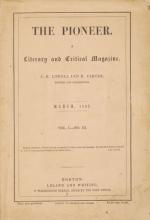
Though it would be inconceivable to attempt to pinpoint the true reason behind humankind's fascination with mortality, it is nonetheless possible to analyze manifestations of this fascination in literature. The Pioneer, a short-lived journal of high rapport from the antebellum era of literature, seems to exhibit exactly this kind of fascination in its selection of publications. Not only do the themes of this journal evaluate human mortality, but also the relationship between this mortality and other great fascinations of mankind. A close reading of Issue 1 of the first (and only) volume of The Pioneer reveals the existence of a vein of constant tension between mortality, spirituality, and love in its content. This tension exhibits itself throughout works of multiple formats in the issue. Here are just a few examples:
J.R. Lowell’s “Sonnet” paints a picture of love which transcends mortality. Furthermore, as my peer Valerie Hoke suggests in her editorial note on the poem, it becomes evident that love is a key component to the preservation of earth’s beauty.
In “The Tell-Tale Heart” by Edgar Allan Poe, the narrator’s crazed obsession with an old man’s eye is only resolved through the necessary death of the old man. In turn, the narrator himself is brought to ruin by the old man’s refusal to let go of life.
In the anonymously published poem “The Rose,” we find that love is bound by mortality, while the shackles of life are loosed by that same mortality. As discussed by myself in the editorial note for “The Rose,” we may also perceive an emergence of the idea of anthropocentricism as a possible outcome of these tensions.
The poem “The Poet and Apollo” demonstrates a strong sense of fatalism in that the hero’s life and death are held entirely in the hands of the gods. As is discussed by my peer Shannon Higgins in her editorial note on the piece, death itself is lauded as a gift meant to bring the hero ultimate fulfillment.
Throughout The Pioneer, mortality, spirituality, and love all exist in a tense balance, here supporting one another, and here clashing with each other. The editors of The Pioneer, J.R. Lowell and Robert Carter, lay out a plea for truth in their introduction article for the macabre January 1843 issue of the journal. If the journal itself can be viewed as a manifestation of the editors’ professed quest for truth, then the recurring morbid themes of the journal’s featured stories might be viewed as being interconnected in their relationship to the editors’ primary objective of discovering ultimate truth. As noted by my peer Kelsey Whiteside in her editorial note for the first issue’s introduction, the editors of The Pioneer seem to exhibit a certain cynicism towards humanity. Seemingly, one of humankind’s great “truths” is its own mortality. The evaluation of these shifting tensions may reveal what is described by Dr. Paul Hurh as an editorial “thematic flicker” throughout the entire first issue of The Pioneer.